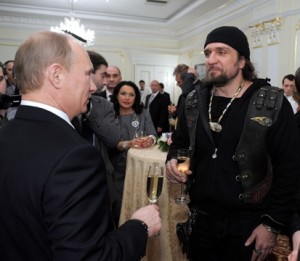Focus on Ukraine: The Night Wolves
 “The Night Wolves” of Russia are muscular, bearded men with beer bellies and tattoos, usually astride Harley-Davidson motorcycles. It is not an image with which a serious political leader might wish to associate themselves with, one would have imagined. However, the aforementioned group are indeed now a familiar part of President Vladimir Putin’s PR antics. What part, we ask ourselves, can these neo-Nazis play in Russian politics?
“The Night Wolves” of Russia are muscular, bearded men with beer bellies and tattoos, usually astride Harley-Davidson motorcycles. It is not an image with which a serious political leader might wish to associate themselves with, one would have imagined. However, the aforementioned group are indeed now a familiar part of President Vladimir Putin’s PR antics. What part, we ask ourselves, can these neo-Nazis play in Russian politics?
What the Night Wolves purport to believe defines them as deeply conservative, patriotic, ultra-nationalist Slavophiles. They reject all law, putting instead their trust in “the brotherhood.” They are deeply mysogynistic, anti-gay, anti-Semitic, racist, detesting American pop culture, blaming the “pussy riots” and Russia’s social problems on the tendency of Russian youth to chew gum and wear tight jeans. They have been compared to the paramilitary thugs of Nazi Germany and to the riot gangs of the Sudetenland, Danzig and Vienna circa 1937 – 38. But a better historical analogy would be “the Gangs of New York” and the Tammany Hall politics of 19th century America, with its rigged elections and financial corruption. They are as much a phenomena of unrestrained capitalism as of post-capitalism as of post-communist Russia.
The Night Wolves enable Putin to portray himself (and by extension, contemporary Russia) as virile and powerful, after decades of incompetent government with befuddled, alcoholic leadership that ended up humiliating the motherland by surrendering her control over her satellite colonies; Bulgaria, Romania, Poland, East Germany, Moldova, Latvia and Lithuania. The bikers appeal to the very large number of middle-aged Russians who still remember Stalin with affection. It is no coincidence that the emblem of the bikers is a flaming wolf’s head, the very image doodled by Stalin whilst he signed death warrants. Many older Russians still equate law and order with a strong and centralised paternal state.
In the Ukraine and Crimea the bikers are useful as bullies, doing the necessary coercion at election time and providing the fodder for “Rent-a-crowd”, Russian style. More worryingly, they have affiliated chapters in all the former-Soviet states, and after recent events in the Ukraine many politicians in these territories fear they may be used to undermine their own domestic politics.
What do the Night Wolves get out of their association with Putin, then? They get publicity, a feeling of importance and power through the impression that they are shaping the youth of Russia for the future, even a sense of legitimacy and respect via the approval of the Russian Orthodox Church. This legitimacy has recently been underscored by the award given to the Night Wolves’ leader, Alexander Zaidostunov, who received the “Order of Honour” for his work raising the patriotism of the young. The young are important to Putin for two reasons; The Russian population is ageing and in decline and they represent the future; he needs more than the old babushkas to vote for him if he is to maintain power.
What the Night Wolves want is exactly what Putin and Russian nationalists want: a strong and powerful Russia that is able to humiliate America and her hated pop culture, a patriotic youth instead of a decadent, indifferent one as in the West, and a return to Russia’s great imperialist past, with real control and influence in all her former satellites.